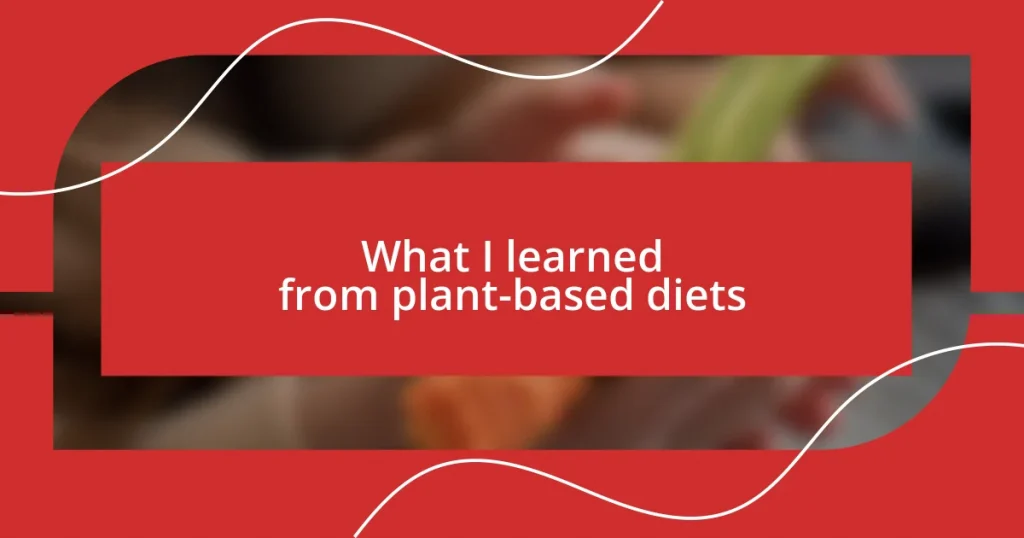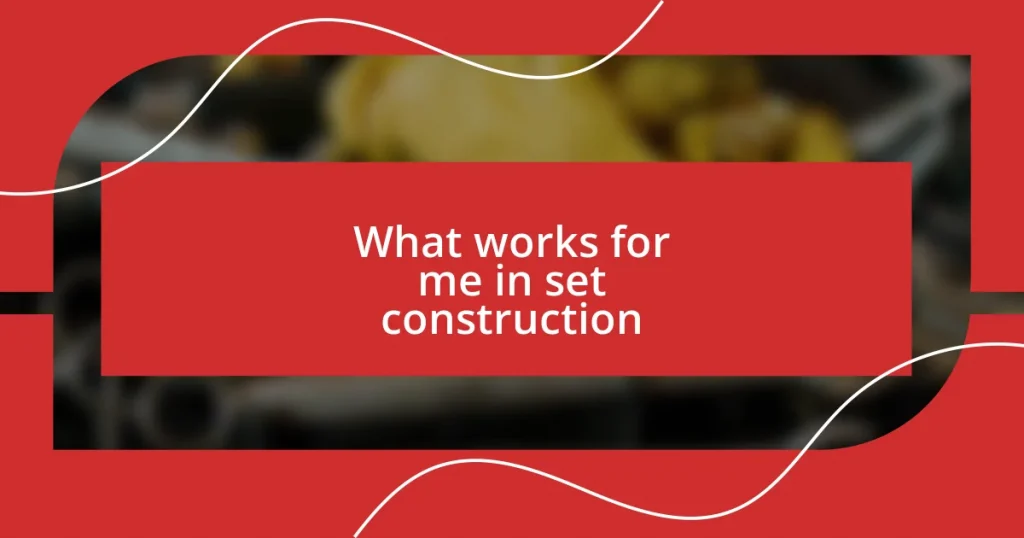Key takeaways:
- Transitioning to a plant-based diet can enhance energy levels, improve heart health, and boost mental well-being through a variety of nutritious foods.
- Common misconceptions include the belief that plant-based eating is restrictive, complicated, or leads to protein deficiency; in reality, it encourages creativity and culinary exploration.
- Meal planning and community support play crucial roles in successfully adopting a plant-based lifestyle, transforming cooking into a joyful and mindful practice.
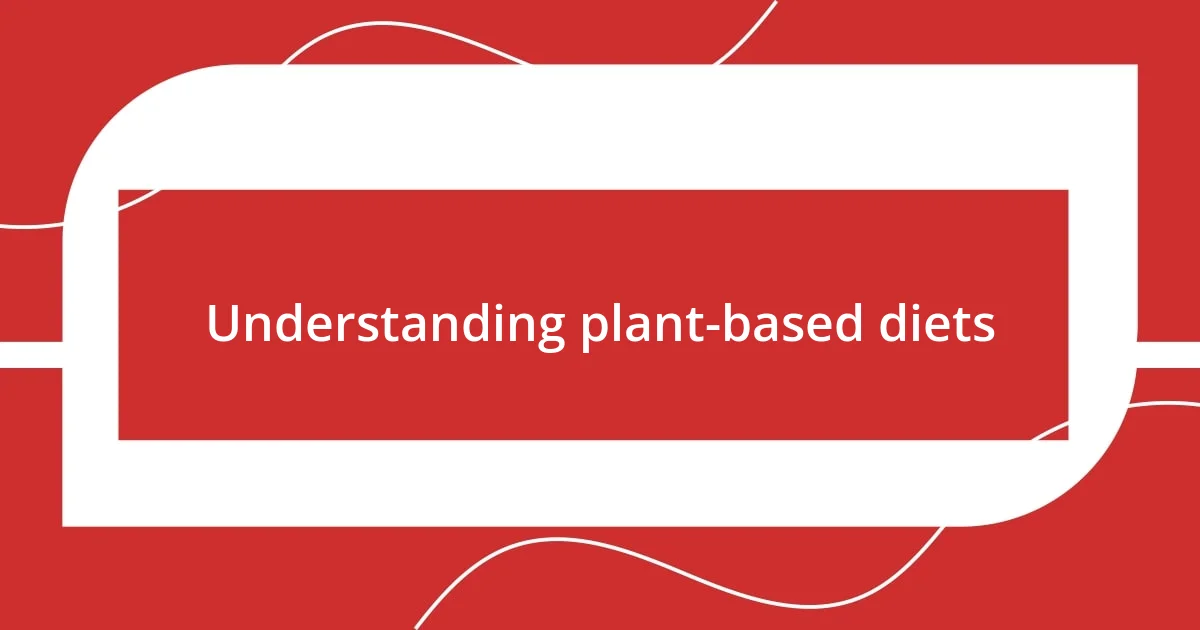
Understanding plant-based diets
Understanding plant-based diets means diving into the idea that food can be a form of medicine. I remember the first time I cut out meat; it was a gut-wrenching decision because I loved bacon. But as I explored more about the benefits of plant-based eating, I realized that each meal was a chance to nourish my body with vibrant colors and diverse textures.
There’s a misconception that going plant-based is a sacrifice, but I found it to be the opposite. I started experimenting with ingredients I had never touched before, like jackfruit and quinoa, which opened up a world of culinary possibilities. Can you imagine transforming simple beans into a hearty, delicious chili? It’s empowering when you discover that nutritious meals can also tickle your taste buds.
When I think of a plant-based diet, I see it as an invitation to reconnect with nature. Walking through a farmers’ market filled with fresh produce became my weekend ritual. Each vibrant fruit and vegetable tells a story, and I can’t help but feel a sense of joy knowing that by choosing plants, I’m making a conscious choice for my health and the planet. How could anyone resist that kind of connection?
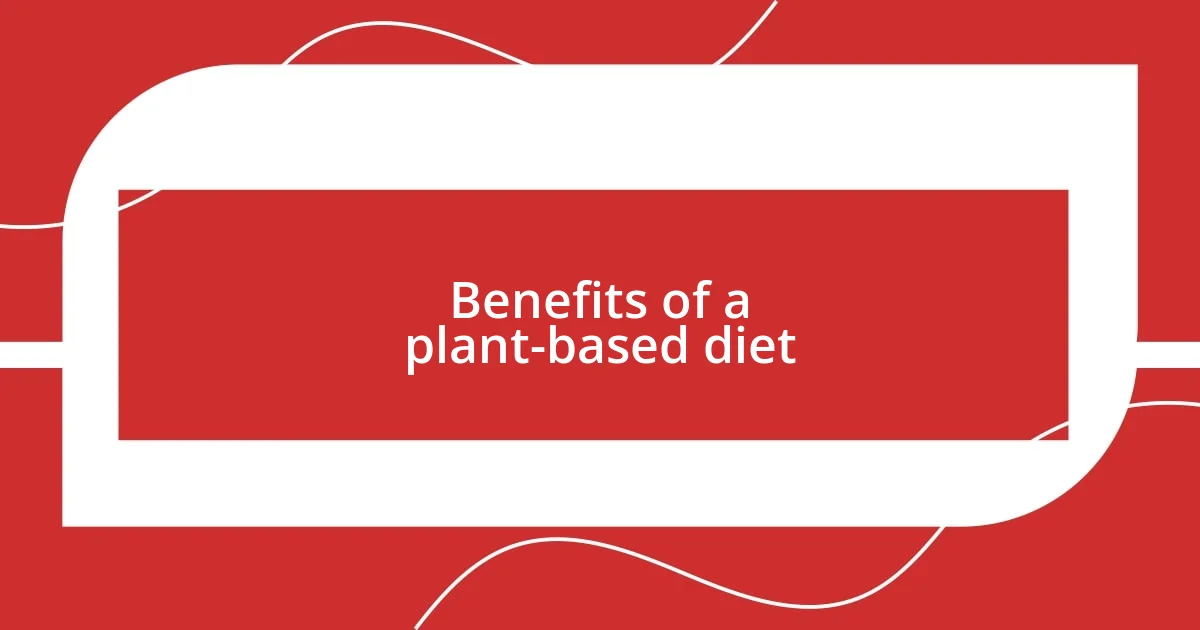
Benefits of a plant-based diet
The benefits of a plant-based diet are abundant and fascinating. One of the most profound changes I experienced was a noticeable increase in my energy levels. I remember the afternoon slumps I used to face, but now, after swapping out saturated fats for wholesome grains and leafy greens, I’ve found that I can power through my day with clarity and vigor. It’s incredible how food can shift your whole outlook!
Incorporating a variety of plant-based foods has also positively impacted my heart health. After a few months of eating more legumes and nuts, my doctor noted improvements in my cholesterol levels. I felt proud knowing my choices were not just benefiting me but were contributing to a healthier lifestyle over the long run. These little victories have truly empowered me to stick with it.
Another significant benefit is the boost to my mental well-being. I noticed that since adopting a plant-based diet, my mood has improved remarkably. Preparing meals filled with colorful vegetables tends to lift my spirits, turning cooking into a joyful event rather than a chore. It’s like each meal is a celebration of life and health—a feast of vibrant energy!
| Benefit | Impact |
|---|---|
| Increased Energy Levels | Improved focus and reduced afternoon slumps |
| Heart Health Improvement | Lower cholesterol and better overall cardiovascular health |
| Mental Well-being Boost | Enhanced mood and joy in cooking |
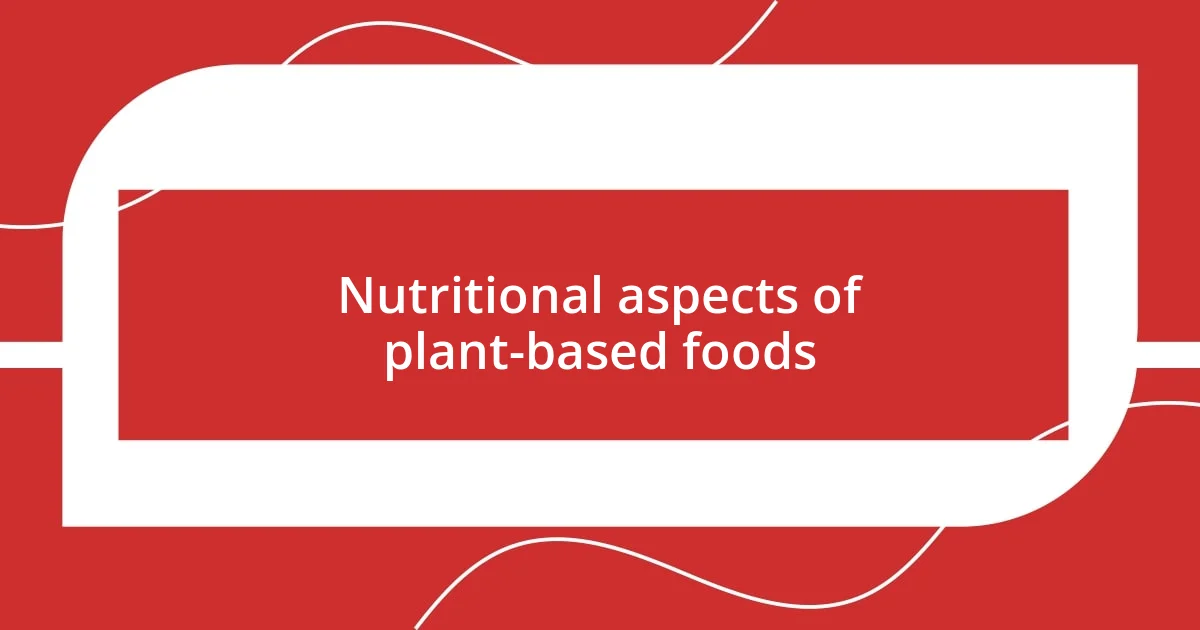
Nutritional aspects of plant-based foods
When diving deeper into the nutritional aspects of plant-based foods, one thing that really stands out to me is the plethora of vitamins and minerals they provide. I vividly recall my first time trying spirulina—a nutrient-dense algae—and how blown away I was by the burst of energy it gave me. It’s like tapping into a natural power source that comes straight from the earth. Combining a wide range of colorful fruits and vegetables not only satisfied my taste buds but also ensured I was loading up on antioxidants, which are key in fighting off free radicals in our bodies.
Here’s a quick look at what makes plant-based foods so nutritionally valuable:
- Rich in Fiber: Helps with digestion and keeps you feeling fuller longer.
- High in Antioxidants: Combat oxidative stress and reduce the risk of chronic diseases.
- Packed with Phytonutrients: Support overall health and enhance immune function.
- Low in Saturated Fats: Linked to lower cholesterol levels and a healthier heart.
- Diverse Protein Sources: Options like lentils and chickpeas provide essential amino acids.
I remember experimenting with lentils for the first time, and with each mouthful of that hearty stew I created, I felt a blanket of warmth and satisfaction envelop me. Replacing animal proteins with plant options broadened my culinary horizon while also enriching my nutrient intake. It’s amazing how something as simple as a bowl of vegetables can be filled with so much life and nutrition!
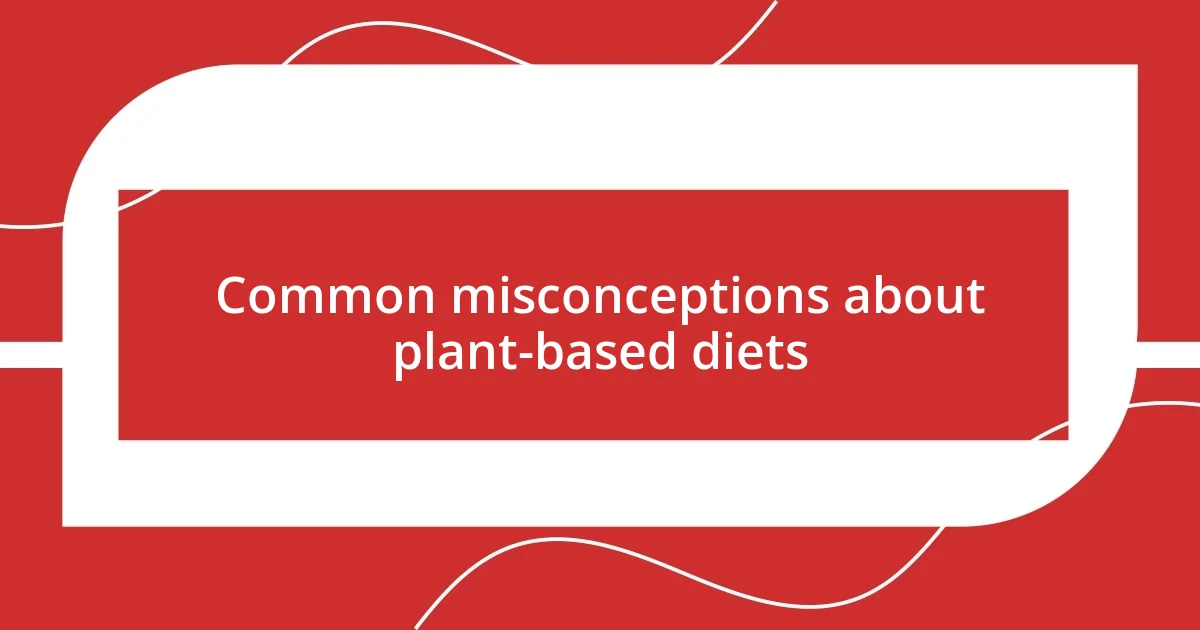
Common misconceptions about plant-based diets
So many think adopting a plant-based diet means giving up their favorite foods. I get it; I felt the same way at first! But over time, I discovered that it’s more about reimagining what I love rather than relinquishing it. Instead of missing steak, I found joy in the umami flavors of mushrooms and hearty jackfruit dishes. It’s all about creativity, not deprivation!
Another common misconception is the fear of protein deficiency. This is perhaps the most laughable for me now. When I first started, I stressed over hitting my protein goals, but I quickly learned that legumes, nuts, and even quinoa pack a protein punch! It’s amazing how a simple, nourishing lentil salad can meet my protein needs just as effectively as a burger. Did I ever have to compromise on taste? Absolutely not!
Lastly, some people assume that plant-based diets are time-consuming and complicated. I used to dread the thought of prepping multiple meals, but I soon realized that simplicity could be beautiful. Throwing together a colorful stir-fry or a nourishing bowl of grains and veggies takes just minutes. Plus, I now feel empowered when I know exactly what’s going into my meals. Has it changed my relationship with food? Definitely! Each meal feels intentional, and I take pride in what I fuel my body with.
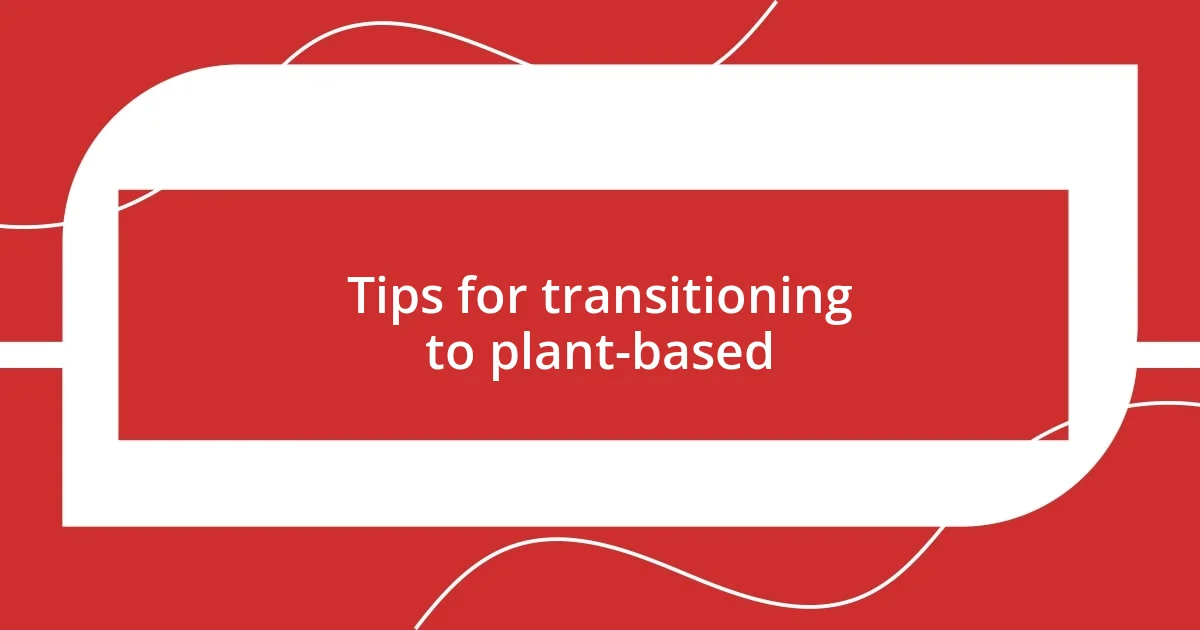
Tips for transitioning to plant-based
When I decided to transition to a plant-based diet, I started small. I didn’t throw away everything in my pantry; instead, I replaced one meal at a time. That first meatless Monday felt liberating—how refreshing it was to rediscover flavors I had overlooked before! I chose a vibrant veggie stir-fry packed with colors and textures, and it sparked a sense of creativity I hadn’t felt in my cooking for years.
As I explored plant-based options, I quickly learned about meal prepping. I carved out time on weekends to prepare big batches of grains and legumes, which saved me so much time during the busy week. I found that having these staples ready to go not only made dinner decisions easier but also helped me resist the temptation of convenience foods. Have you ever noticed how much better it feels to whip up a nourishing bowl in minutes than to rely on takeout? The satisfaction I felt from nourishing my body with wholesome ingredients was an incredible motivator.
One tip I can’t stress enough is to experiment with new recipes—your taste buds will thank you! I recall a time I ventured into making chickpea curry, and wow, the aroma filled my kitchen and transported me to faraway places! Embracing these culinary adventures not only made the transition enjoyable but also opened up a world of flavors I never knew existed. Remember, every step you take toward plant-based eating is a step toward a healthier you!
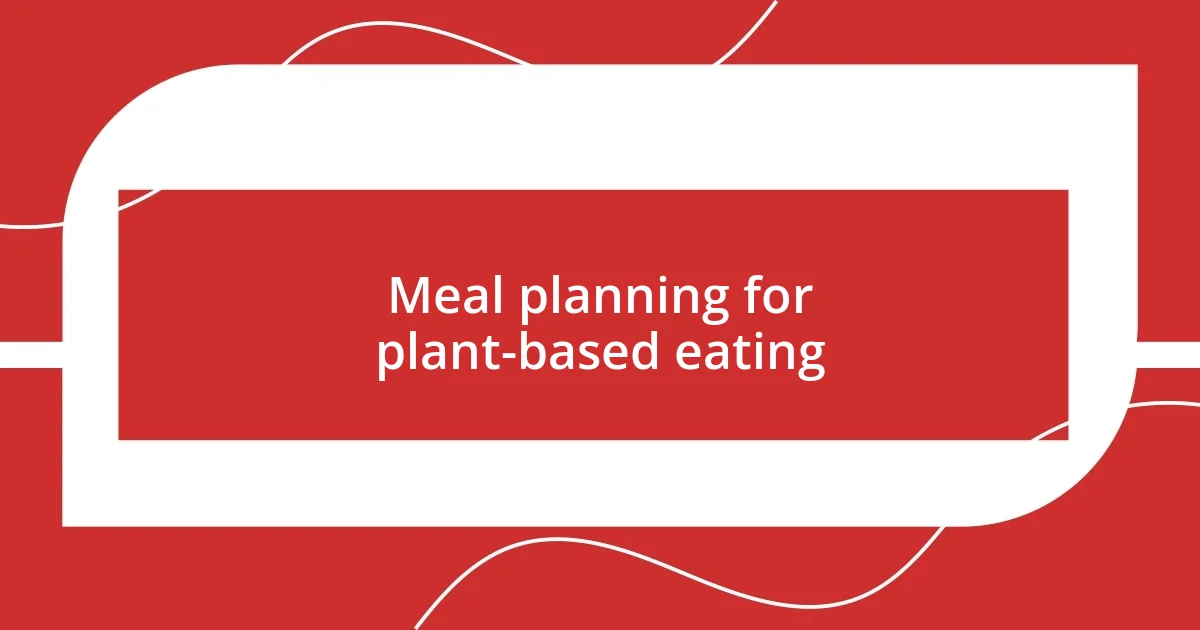
Meal planning for plant-based eating
Meal planning for plant-based eating can seem daunting at first, but I’ve found it to be a game-changer in embracing this lifestyle. I started by mapping out my week, creating a rough outline of meals that included a variety of colorful veggies, grains, and protein sources. This not only simplified my grocery shopping but also excited me about trying new combinations. Ever tried putting roasted chickpeas on your salad? The crunch is simply delightful!
As I became more comfortable, I began batch cooking staples like quinoa and beans on Sundays. I still remember the joy of opening my fridge to find containers of ready-to-eat grains and legumes, knowing I could throw together a meal in minutes. It’s also a fantastic way to avoid the last-minute takeout temptation. Have you ever felt that sense of relief when a hard day doesn’t end in a scramble for dinner? I certainly have!
I also recommend building a rotating recipe list to avoid meal fatigue. What works wonders for me is to keep a collection of my favorite go-to recipes that I can mix and match. For instance, I might make a big pot of chili one week and then transform the leftovers into a taco night. It’s like getting two meals for the effort of one! This flexibility allows me to enjoy variety while reducing the stress of daily cooking. Plus, I often find myself excited to share my creations with friends—plant-based meals can be a true conversation starter!
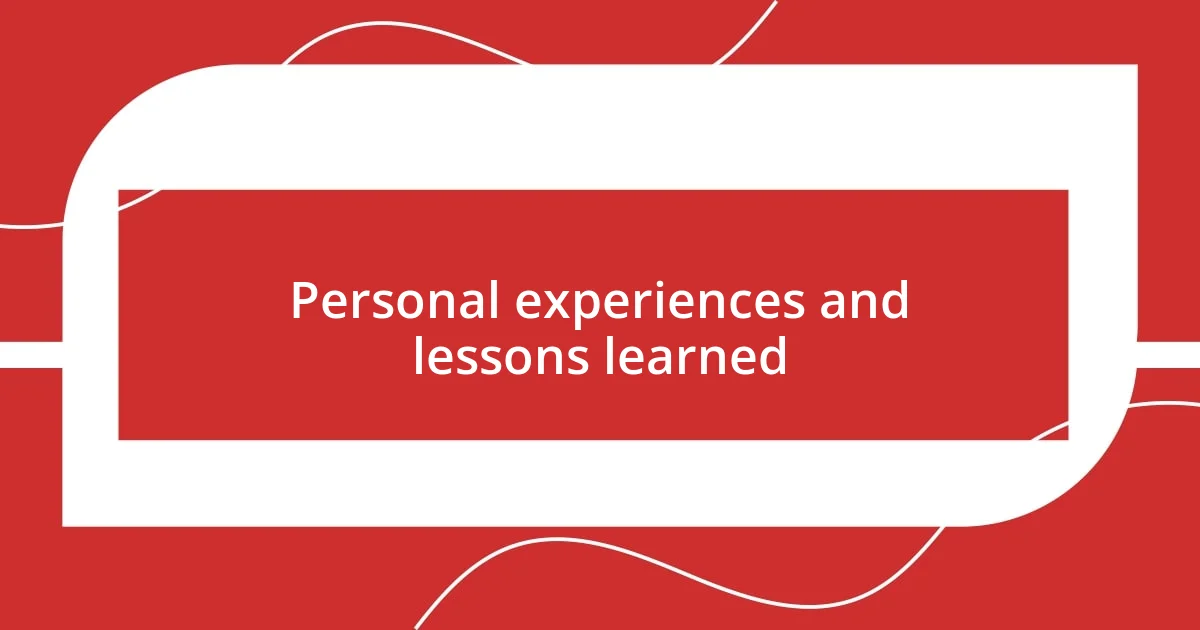
Personal experiences and lessons learned
Transitioning to a plant-based diet was more than a dietary choice for me; it sparked a profound emotional journey. I remember a moment when I prepared a simple lentil soup, and as the scent wafted through my kitchen, I was reminded of family gatherings from my childhood. Food has a way of connecting us with memories, doesn’t it? This newfound appreciation for meal preparation turned cooking into a mindful practice, rather than just a chore.
As I navigated this lifestyle shift, I discovered the importance of community support. I joined an online group where I could share my experiences and learn from others. The camaraderie was uplifting—imagine sharing a cooking success story or even a failure and receiving encouragement from fellow plant-based enthusiasts. Have you ever felt that rush of motivation from connecting with others on a similar journey? For me, it made an intimidating challenge feel like a collaborative adventure.
Another lesson learned was the power of choice. While it might sound trivial, I realized that choosing plant-based options helped me feel more in control of my health. I distinctly remember a night at a restaurant where the waiter asked if I wanted the garlic butter on my veggies. I paused, took a breath, and confidently opted for the grilled option instead. That moment felt empowering; I was actively participating in my own well-being. Isn’t that a beautiful part of this journey? It’s about making informed choices that align with my values and aspirations, and that has been incredibly rewarding.










